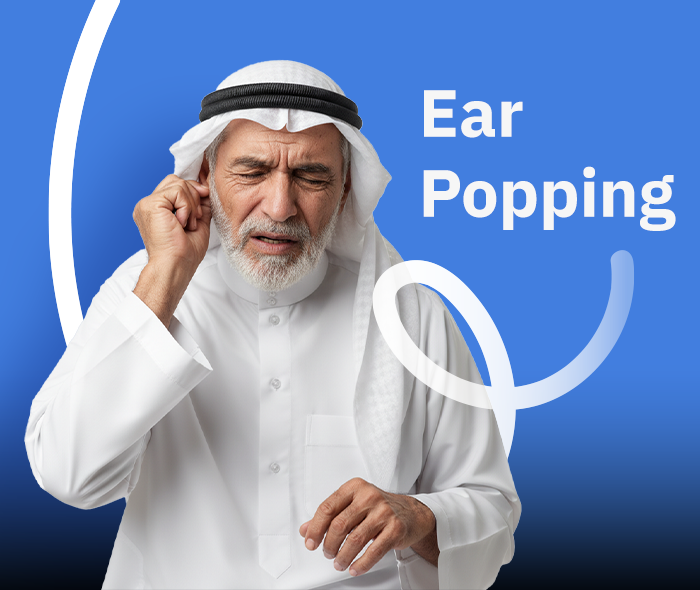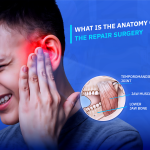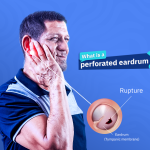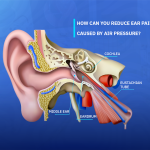Ear Popping
Have you ever heard a crackling sound in your ear while swallowing or yawning? That’s what’s commonly known as ear popping. While it’s usually a natural occurrence, it can sometimes indicate issues within the middle ear or the Eustachian tube. Although most cases of ear popping are harmless, persistent symptoms may require a thorough medical evaluation. In this article, we’ll explore the causes, diagnosis methods, treatment options, and preventive strategies for ear popping.
- What is Ear Popping?
- Causes of Ear Popping
- Diagnosing Ear Popping
- Treatment for Ear Popping
- Home Remedies for Mild Ear Popping
- Preventive Tips
- When is Ear Popping Normal and When is it a Concern?
- When to See a Doctor?
What is Ear Popping?
Ear popping is the sensation or sound of a popping or crackling noise within the ear, typically experienced when swallowing, yawning, or during changes in atmospheric pressure. It is caused by air movement through the Eustachian tube, which functions to equalize pressure between the middle ear and the outside environment.
Causes of Ear Popping
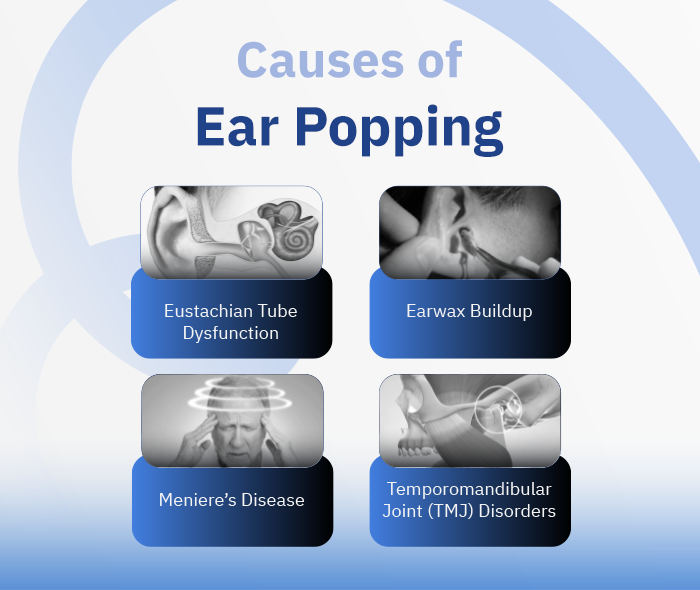
Many people experience ear popping for various reasons. The most common causes include:
The ear naturally produces wax to protect against bacteria and foreign particles. Normally, this wax exits the ear on its own, but in some cases,especially with the frequent use of earbuds, earplugs, or cotton swabs,it can accumulate and block the eardrum, resulting in a popping sensation.
The Eustachian tube may become blocked during a cold or allergic reaction, leading to pressure buildup within the ear. This dysfunction can cause popping sounds, especially during swallowing or speaking. In contrast, dilated Eustachian tubes may cause the same symptoms and are observed in patients who have significant weight loss.
The TMJ connects the lower jaw to the skull. Any dysfunction in this joint can cause pain and movement difficulties. One of the associated symptoms may include popping sounds in the ear, in addition to jaw-related discomfort.
A disorder affecting the inner ear, Meniere’s disease causes symptoms such as ringing (tinnitus), dizziness, and sometimes popping sounds. It commonly appears in individuals between the ages of 20 and 50.
Diagnosing Ear Popping
Diagnosis begins with a full medical history and clinical examination of the ears, nose, throat, and jaw. Depending on the findings, your doctor may recommend specific tests, including:
- Hearing tests
- Tympanometry (to assess eardrum movement)
- Imaging studies such as CT scans or MRI
Treatment for Ear Popping
Treatment depends on the underlying cause and may include:
- Earwax removal, if a blockage is detected.
- Antibiotics, in cases of ear infections.
- Balloon dilation of the Eustachian tube.
- Insertion of ventilation tubes in the middle ear to balance pressure and drain fluids.
- Decongestants or allergy medications for Eustachian tube dysfunction.
- Dental devices or surgery for jaw disorders.
- Medications such as muscle relaxants or tricyclic antidepressants are used to manage TMJ pain.
Home Remedies for Mild Ear Popping
If the popping is occasional and not accompanied by other symptoms, some at-home methods may help, such as:
- Natural pressure equalization: through swallowing, yawning, or chewing.
- Earwax softening: with oil drops, hydrogen peroxide, or over-the-counter solutions.
- Nasal irrigation: using a saline spray to relieve sinus congestion.
- Jaw exercises or massage: for TMJ-related symptoms, along with cold compresses.
Preventive Tips
- Reduce the risk of colds and flu by washing hands frequently and avoiding sick individuals.
- Avoid using cotton swabs inside the ear canal, as they can push wax further in.
- Use earplugs to protect from loud noise exposure.
- Stay away from irritants such as smoke and pollution.
When is Ear Popping Normal and When is it a Concern?
Normal Cases:
Ear popping is usually harmless in the following situations:
- During airplane travel or elevator rides, due to pressure changes.
- While yawning or swallowing (natural Eustachian tube activity).
- When changing head position or while sleeping.
- While swimming or diving.
In such cases, the popping usually resolves on its own without the need for medical treatment.
Concerning Cases:
Ear popping may indicate a medical issue if:
- It occurs daily or frequently.
- It’s accompanied by ear pain or hearing loss.
- There’s a feeling of fullness or blockage in the ear.
- There’s ear discharge.
- It follows chronic infections in the nose, sinuses, or throat.
- It appears after a direct injury to the head or ear.
When to See a Doctor?
Consult a doctor if:
- Symptoms persist or worsen.
- Signs of an ear infection appear.
- Popping interferes with daily life or affects hearing.
- There’s discharge that includes pus or blood.
Ear popping is a common symptom that’s often harmless and temporary. However, in some cases, it may signal a more serious condition requiring medical attention. Maintaining good ear hygiene and protecting against infections can help reduce the risk. If ear popping continues or is accompanied by other symptoms, consult an ENT specialist to ensure your hearing and ear health are in good condition.
